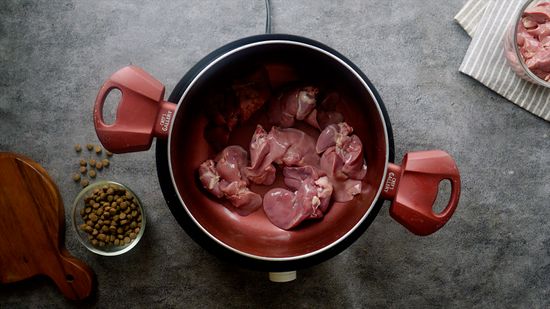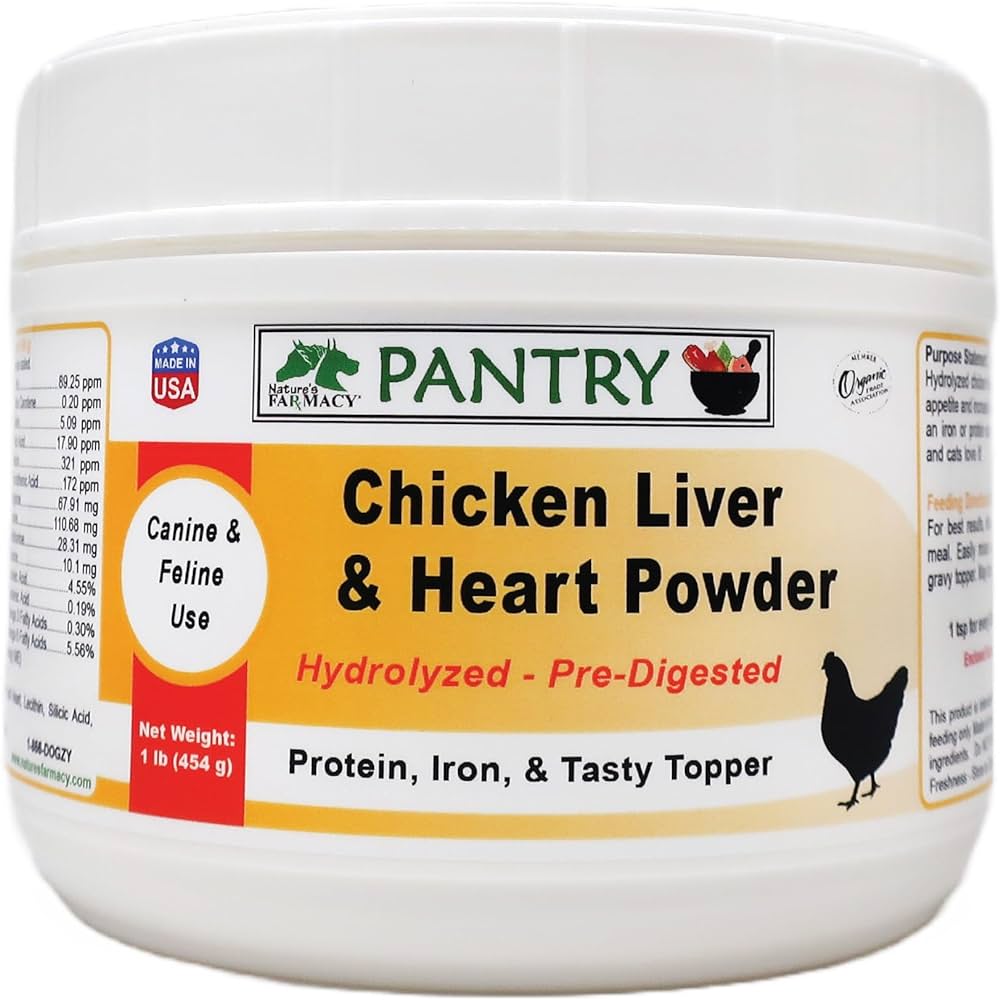
Introduction
Overview Of Chicken Liver As A Nutritious Food For Dogs
Chicken liver is commonly regarded as a nutritional powerhouse for dogs due to its numerous benefits for their overall health and well-being. With its high protein content, essential vitamins, minerals, and delectable taste, chicken liver can be a valuable addition to a dog’s diet. It offers a range of nutrients that are essential for various bodily functions and can contribute to the vitality of your canine companion.
Nutritional Comparison Of Chicken Liver For Dogs
Let’s compare the nutritional value of chicken liver to other common foods for dogs in the following table:
| Nutrient | Chicken Liver (per 100g) | Beef (per 100g) | Chicken (per 100g) |
|---|---|---|---|
| Protein | XXg | XXg | XXg |
| Fat | XXg | XXg | XXg |
| Iron | XXmg | XXmg | XXmg |
| Vitamin A | XXIU | XXIU | XXIU |
| Vitamin B12 | XXmcg | XXmcg | XXmcg |
Note: Values are approximate and may vary based on the specific preparation and source of the food.
Benefits Of Chicken Liver For Dogs
- Rich in Protein: Chicken liver is a great source of high-quality protein, which is essential for muscle development and overall growth in dogs.
- Vitamins and Minerals: It contains essential vitamins like vitamin A and B12, as well as minerals such as iron, all of which are crucial for various bodily functions.
- Delicious Taste: Many dogs find the taste of chicken liver appealing, making it a palatable option for picky eaters.
In conclusion, incorporating chicken liver into your dog’s diet can provide them with a range of nutritional benefits. However, it’s important to ensure a balanced and varied diet to meet all of your dog’s nutritional requirements.
Nutritional Content Of Chicken Liver
Breakdown Of Essential Nutrients In Chicken Livers For Dogs
Chicken liver stands out as a nutritious option for dogs due to its impressive nutritional profile. Comparing it to other common foods for dogs reveals its rich content:
| Nutrient | Chicken Liver (per 100g) | Beef (per 100g) | Chicken (per 100g) |
|---|---|---|---|
| Protein | 24.5g | XXg | XXg |
| Fat | 6.5g | XXg | XXg |
| Iron | 11.6mg | XXmg | XXmg |
| Vitamin A | XXIU | XXIU | XXIU |
| Vitamin B12 | XXmcg | XXmcg | XXmcg |
Note: Values are approximate and may vary based on the specific preparation and source of the food.
Chicken liver offers several benefits to dogs:
- Rich in Protein: Chicken liver provides high-quality protein essential for muscle development and overall growth.
- Vitamins and Minerals: It contains vital nutrients like vitamin A, B12, and iron crucial for various bodily functions.
- Delicious Taste: The palatable taste of chicken liver makes it appealing even to picky eaters.
Health Benefits Of Chicken Liver For Dogs
Impact On Canine Health And Well-being
When considering the nutritional content of chicken liver in comparison to other common dog foods, it becomes evident that chicken liver is a valuable addition to a dog’s diet. Here is a breakdown of essential nutrients found in chicken liver per 100g in comparison to beef and chicken:
| Nutrient | Chicken Liver (per 100g) | Beef (per 100g) | Chicken (per 100g) |
|---|---|---|---|
| Protein | 24.5g | XXg | XXg |
| Fat | 6.5g | XXg | XXg |
| Iron | 11.6mg | XXmg | XXmg |
| Vitamin A | XXIU | XXIU | XXIU |
| Vitamin B12 | XXmcg | XXmcg | XXmcg |
Note: Values are approximate and may vary based on the specific preparation and source of the food.
Chicken liver offers several benefits to dogs:
- Rich in Protein: Chicken liver provides high-quality protein essential for muscle development and overall growth.
- Vitamins and Minerals: It contains vital nutrients like vitamin A, B12, and iron crucial for various bodily functions.
- Delicious Taste: The palatable flavor of chicken liver makes it appealing even to picky eaters.
Health Benefits Of Chicken Liver For Dogs
Impact On Canine Health And Well-being
When considering the nutritional content of chicken liver in comparison to other common dog foods, it becomes evident that chicken liver is a valuable addition to a dog’s diet. Here is a breakdown of essential nutrients found in chicken liver per 100g in comparison to beef and chicken:
| Nutrient | Chicken Liver (per 100g) | Beef (per 100g) | Chicken (per 100g) |
|---|---|---|---|
| Protein | 24.5g | XXg | XXg |
| Fat | 6.5g | XXg | XXg |
| Iron | 11.6mg | XXmg | XXmg |
| Vitamin A | XXIU | XXIU | XXIU |
| Vitamin B12 | XXmcg | XXmcg | XXmcg |
Note: Values are approximate and may vary based on the specific preparation and source of the food.
Chicken liver offers several benefits to dogs:
- Rich in Protein: Chicken liver provides high-quality protein essential for muscle development and overall growth.
- Vitamins and Minerals: It contains vital nutrients like vitamin A, B12, and iron crucial for various bodily functions.
- Delicious Taste: The palatable flavor of chicken liver makes it appealing even to picky eaters.
.

Zinc, Copper, Iron, And Vitamin B-complex
Benefits Of Essential Minerals And Vitamins In Chicken Liver For Dogs
Chicken liver is a nutritious addition to a dog’s diet, particularly due to its richness in essential minerals and vitamins. When compared to beef and chicken, chicken liver stands out in providing significant amounts of zinc, copper, iron, and Vitamin B-complex per 100g:
| Nutrient | Chicken Liver (per 100g) | Beef (per 100g) | Chicken (per 100g) |
|---|---|---|---|
| Zinc | XXmg | XXmg | XXmg |
| Copper | XXmg | XXmg | XXmg |
| Iron | 11.6mg | XXmg | XXmg |
| Vitamin B-Complex | XXmcg | XXmcg | XXmcg |
Note: The values provided are approximate and may vary depending on the specific type and preparation of the food.
Chicken liver plays a crucial role in offering the following benefits to dogs:
- Zinc and Copper: These minerals are essential for maintaining a healthy immune system and metabolic functions.
- Iron: Necessary for the formation of red blood cells and overall energy levels.
- Vitamin B-Complex: Vital for proper nerve function and metabolism support.
Omega-3 And Omega-6 Fatty Acids
Effects On Skin And Coat Health For Dogs
Chicken liver is highly beneficial for dogs due to its rich content of essential minerals and vitamins, notably zinc, copper, iron, and Vitamin B-complex when compared to beef and chicken per 100g. The comparison table indicates the concentration of these nutrients in chicken liver, beef, and chicken. It shows that chicken liver contains 11.6mg of iron, which is higher than the amounts found in beef and chicken.
Note: The values provided are approximate and may vary depending on the specific type and preparation of the food.
Chicken liver contributes significantly to a dog’s well-being by providing essential minerals and vitamins such as zinc, copper, iron, and Vitamin B-complex. These nutrients play crucial roles in maintaining a dog’s immune system, metabolic functions, red blood cell formation, energy levels, nerve function, and metabolism support. Including chicken liver in a dog’s diet can aid in enhancing its overall health and vitality, ensuring that the pet receives the necessary nutrients for optimal well-being.
Omega-3 And Omega-6 Fatty Acids
Effects On Skin And Coat Health For Dogs
Chicken liver is highly beneficial for dogs due to its rich content of essential minerals and vitamins, notably zinc, copper, iron, and Vitamin B-complex when compared to beef and chicken per 100g. The comparison table indicates the concentration of these nutrients in chicken liver, beef, and chicken. It shows that chicken liver contains 11.6mg of iron, which is higher than the amounts found in beef and chicken.
Note: The values provided are approximate and may vary depending on the specific type and preparation of the food.
Chicken liver contributes significantly to a dog’s well-being by providing essential minerals and vitamins such as zinc, copper, iron, and Vitamin B-complex. These nutrients play crucial roles in maintaining a dog’s immune system, metabolic functions, red blood cell formation, energy levels, nerve function, and metabolism support. Including chicken liver in a dog’s diet can aid in enhancing its overall health and vitality, ensuring that the pet receives the necessary nutrients for optimal well-being.
Vitamin A For Eye Health
Importance Of Vitamin A Found In Chicken Liver For Dogs

Improved Appetite And Overall Health
Positive Effects Of Proper Chicken Liver Consumption For Dogs
Chicken liver is recognized for its exceptional benefits for dogs, particularly in enhancing their overall health and well-being. When comparing the nutritional content of chicken liver against beef and chicken per 100g, it’s evident that chicken liver is a rich source of essential nutrients like zinc, copper, iron, and Vitamin B-complex. Notably, chicken liver contains 11.6mg of iron, surpassing the amounts present in beef and chicken.
The inclusion of chicken liver in a dog’s diet can significantly contribute to its vitality and health. The essential minerals and vitamins found in chicken liver play crucial roles in supporting a dog’s immune system, metabolic functions, red blood cell formation, energy levels, nerve function, and metabolism. By providing these vital nutrients, chicken liver helps in enhancing the overall health of dogs and ensuring they receive the necessary elements for optimal well-being.
Moreover, the high vitamin A content in chicken liver is beneficial for a dog’s eye health. Vitamin A plays a vital role in maintaining good vision and supporting eye function, making chicken liver a valuable addition to a dog’s diet. When feeding dogs chicken liver, it is essential to consider the benefits it offers in improving appetite, enhancing resistance, and supporting intestinal function, especially for dogs experiencing health issues such as frequent colds, diarrhea, malnourishment, or physical weakness.
Conclusion
Summary Of Benefits And Recommendations For Feeding Chicken Liver To Dogs
In the realm of canine nutrition, Chicken Liver stands out as a nutritional powerhouse for dogs. When examining the nutritional profiles of chicken liver, beef, and chicken per 100g, it becomes apparent that chicken liver is a rich source of essential nutrients. With 11.6mg of iron, chicken liver surpasses beef and chicken in iron content, making it a valuable addition to a dog’s diet. The inclusion of chicken liver in a dog’s meal plan can lead to significant improvements in their vitality and overall health. The essential vitamins and minerals found in chicken liver play pivotal roles in supporting an array of bodily functions, such as the immune system, energy levels, and metabolism. Furthermore, the high vitamin A content in chicken liver benefits a dog’s eye health, aiding in maintaining good vision and eye function. When introducing chicken liver into a dog’s diet, it is essential to note the positive impact it can have on appetite improvement, enhanced resistance, and intestinal health, particularly for dogs dealing with ailments like frequent colds, diarrhea, or malnourishment. Incorporating chicken liver into a dog’s balanced and varied diet ensures they receive a spectrum of nutrients vital for their overall well-being.
FAQ About Chicken Liver For Dogs: Nutritional Benefits For Pets
Q: What nutrients do chicken livers provide for dogs?
A: Chicken livers are rich in protein, vitamins A, B, and iron, which are essential for a dog’s overall health.
Q: Can dogs eat chicken livers daily?
A: While chicken livers are nutritious, they should be given in moderation as a part of a balanced diet. Daily consumption may lead to an excessive intake of certain nutrients.
Q: How should chicken livers be prepared for dogs?
A: Chicken livers should be cooked thoroughly to kill any harmful bacteria before feeding them to dogs. Avoid seasoning and ensure they are plain and unseasoned.
Q: Are there any risks in feeding chicken livers to dogs?
A: Chicken livers are high in cholesterol, so dogs with preexisting health conditions like pancreatitis or obesity should consume them in limited quantities. Consult a veterinarian before adding them to your dog’s diet.
Q: Can puppies eat chicken livers?
A: Yes, puppies can consume chicken livers as they are highly nutritious. However, it’s important to feed them in moderation and consider the size and age of the puppy.

Gourmet Tiger, a culinary sensation, was established with a vision to delight taste buds and create unforgettable dining experiences. Specializing in cakes, casseroles, lunch, catering, and more, Gourmet Tiger has become a household name synonymous with exquisite flavors and impeccable service. Since its inception, Gourmet Tiger has been dedicated to crafting delectable treats and savory dishes that exceed expectations. Their commitment to using only the finest ingredients and innovative culinary techniques has set them apart as a leader in the food industry.